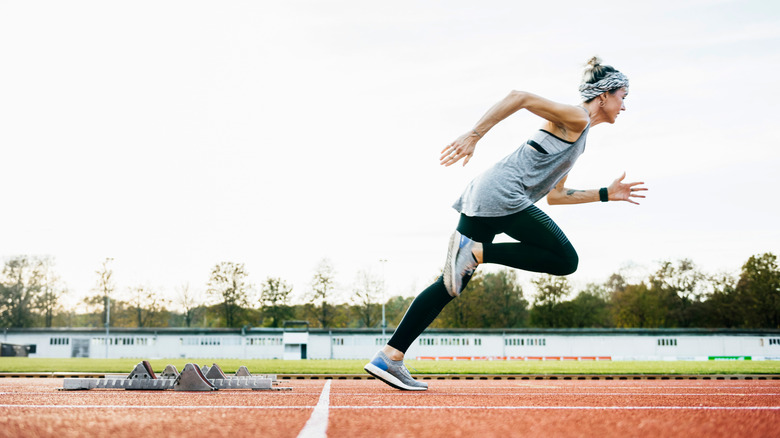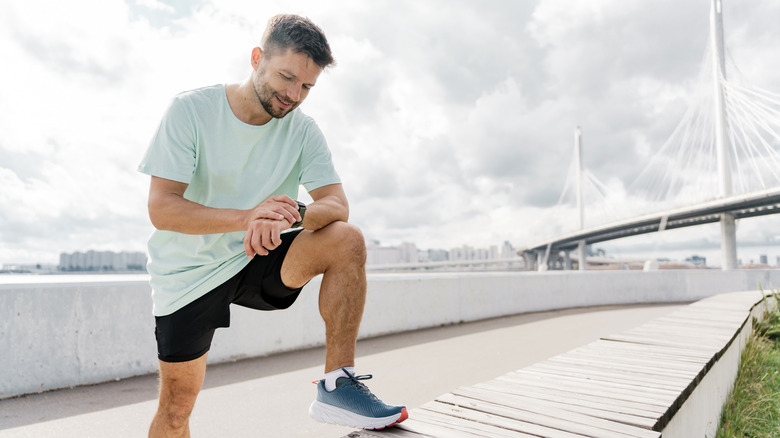Science Explains Why Intense Exercise Distorts Our Sense Of Time
When your trainer challenges you to hold a plank for a minute, it can feel like the seconds drag by. You're constantly adjusting — lifting your hips, but not too high — to make sure you're targeting your stabilizing core muscles. Your fingers might even clutch the floor, as if giving yourself something else to focus on besides the discomfort. (This is what really happens when you plank every day.)
That feeling that time slows down during tough workouts isn't just in your head. A 2024 study in Brain and Behavior found that your perception of time really does shift. In intense moments of physical stress, your brain kicks your senses into high gear. You start absorbing tons of information about your body and surroundings all at once, which makes a few seconds feel much longer. You're also more focused on the passage of time itself, pulling your attention into the moment. And that can make it feel like time is dragging.
Think working out with a buddy or a competitor might help time fly? Not so much. The same study found that people who did a cycling time trial with the goal of winning performed better, but they still felt time was crawling by.
The more intense, the more time distortion
During high-intensity exercise, your body releases the hormone cortisol to help you prepare for stress. From an evolutionary perspective, this is your sympathetic nervous system giving you the energy and drive to perform, like running from a perceived threat. Even in those intense or dangerous moments, time can feel like it's moving more slowly.
The cycling time trial study found that this distorted perception of time can occur even when effort levels vary. In other words, participants pushed harder when they were told to win against a competitor, but their sense of time slowed down just as much as it did during a solo time trial without an opponent.
Although that particular study didn't look at time distortion during easier efforts, other research has found that the higher the intensity, the more distorted your sense of time becomes. A 2020 study in the Journal of Strength and Conditioning Research had trained runners complete 30-minute treadmill runs at "somewhat hard," "hard," and "very hard" intensities, based on their rating of perceived exertion (RPE). When the runners exercised at the highest intensity, they perceived time as passing more slowly than when they exercised at the less-intense levels.
You may have noticed this time distortion yourself during a tough HIIT class. A 2017 study in Physiology and Behavior tested recreational exercisers' sense of time during a 30-second all-out cycling sprint. As the interval wore on, participants felt time slow down. The researchers also found this effect during a 20-minute rowing workout. At the highest intensity, time felt slower towards the end of the 20 minutes than during less intense sessions.
How this time distortion can affect your workouts
There's a reason you might need a watch or a coach to time your planks. You could be convinced you've held a minute when it's only been 30 seconds. This slower perception of time can also creep in during tough races or too much high-intensity interval training. And while having competitors or workout buddies might distract you enough to push harder, it could also backfire if your goal is to hit a personal best.
If you're a casual exerciser who wants to enjoy your workouts, intense exercise might not be the way to go. That doesn't mean you can't challenge yourself. The study involving runners found that exercising at a "somewhat hard" intensity — an RPE of 13 — didn't slow down the perception of time. This level of effort may help you enjoy the experience more and stay consistent, since you're not as focused on the physical and mental strain that comes with higher intensities.
Your mindset toward exercise also influences how fast time seems to pass. If you dread working out or find it painful, it's going to feel like it drags on. Boredom can do the same. Your workout environment matters, too. Exercising in hot weather can make the same effort feel much harder, stretching out the sense of time. That's why tuning in to your level of effort rather than pace or reps can help you have a more positive and sustainable exercise experience.


